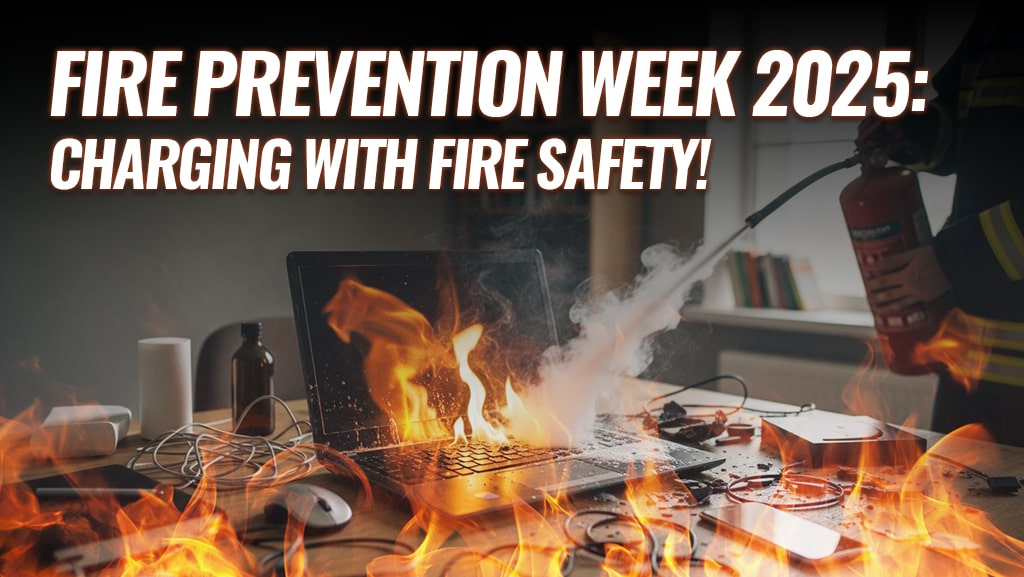
Fire Prevention Week 2025: Charge Into Fire Safety!
Charge Into Fire Safety with Smart Battery Habits
Fire safety is a year-round responsibility, but every October, Fire Prevention Week puts it in the spotlight. The campaign encourages people nationwide to consider what they can do to stop fires. It's official: The theme for Fire Prevention Week 2025, October 5-11, has been announced! "Charge into Fire Safety™: Lithium-Ion Batteries in Your Home.” The campaign stresses how important it is to BUY, CHARGE, and RECYCLE lithium-ion batteries safely.
This year, the focus is on lithium-ion batteries. They power smartphones, laptops, power tools, e-bikes, and dozens of other devices around the house. When damaged or used incorrectly, they can catch fire or even explode! This year is about highlighting practical steps for safely using and storing lithium-ion batteries.
A Century of Fire Prevention
Fire Prevention Week (FPW) has been part of American life for over 100 years! It began in the early twentieth century to commemorate the Great Chicago Fire of 1871 and to promote fire safety in homes and communities. Organized by the National Fire Protection Association (NFPA), it's now the longest-running public health observance in the country.
Local fire departments, schools, and community groups participate in the campaign, hosting events and sharing up-to-date safety messages. Each annual theme addresses a specific risk, like kitchen fires, smoke alarms, or home escape plans, with tips that are easy to implement. Over the years, FPW has helped reduce fire-related injuries and deaths by raising awareness and encouraging consistent safety habits. Check out our piece on The History of Fire Prevention Week to learn more!
Lithium-Ion Batteries in the Spotlight
The theme for National Fire Prevention Week 2025, "Charge Into Fire Safety!" focuses on lithium-ion batteries—a standard power source in modern electronics. These batteries are lightweight, rechargeable, and hold a lot of energy for their size. That's why they're used in everything from phones and tablets to laptops, e-bikes, power tools, headphones, electric scooters, e-cigarettes, and even toys.

That energy density comes with risk. When these batteries are damaged, overcharged, or made with poor-quality components, they can overheat and start a fire! Between 2017 and 2022, there were over 25,000 incidents of lithium-ion battery fires. As more homes rely on rechargeable devices, understanding how to use and store these batteries is becoming a core part of fire prevention.
Here are some of the NFPA's guidelines for lithium-ion battery safety:
Stick With Certified Products
Not all batteries are built to the same standard. Many of the fires linked to batteries come from products that weren't properly tested or certified. This is especially common with off-brand devices and chargers sold online.
When buying anything that uses a lithium-ion battery, look for safety certifications like UL, ETL, or CSA on both the battery and charger. These marks indicate that the product has passed independent safety testing. Avoid products without clear labeling, and be cautious with generic accessories sold through third-party marketplaces. Using uncertified components significantly raises the risk of battery failure!
Charge Devices the Right Way
The way you charge a device matters. Batteries generate heat as they charge, which needs to dissipate. Charging on soft surfaces, like beds, couches, or carpets, can trap heat and increase fire risks. Always charge devices on a hard, flat surface with good airflow.
Avoid overcharging as well! Once a device is fully charged, unplug it. Leaving a battery connected to power for extended periods can shorten its lifespan and raise the chance of overheating. While it's convenient to leave things plugged in overnight, charging while you're awake and nearby is safer, especially if the battery or charger is new or unfamiliar.
Stick with the charging cable that came with the device. Knockoff chargers might look the same, but they often lack essential safety features.
Watch for Warning Signs
Battery failures rarely happen without warning. A battery that's overheating, giving off a chemical smell, or changing shape isn't working as it should, and continuing to use it can be dangerous. Other red flags include strange popping or crackling sounds, surface swelling, or signs of leakage or discoloration. If you notice anything out of the ordinary, stop using the device right away. Unplug it if it's safe, move it away from anything that can burn, and avoid charging it again. When in doubt, contact the manufacturer or take the battery to a recycling facility that can handle damaged units.
Store Batteries with Care
How you store these batteries makes a real difference in reducing fire risk. Keep them away from anything that can catch fire, such as paper, clothing, or cleaning supplies. Heat also plays a major role in battery failure, so avoid leaving devices or spare batteries in direct sunlight, parked cars, or unventilated areas where temperatures can rise quickly.
If you're traveling by plane, store batteries in your carry-on luggage—not in checked bags. This includes batteries in smart luggage and any loose spares. Most airlines follow FAA regulations that prohibit lithium batteries from being placed in the cargo hold, where a fire could go undetected. Keeping batteries with you in the cabin ensures that any issue can be spotted and handled quickly. Click here for more info on TSA battery guidelines!
Don't Throw Batteries in the Trash
Lithium-ion batteries should never be thrown in household trash or standard recycling bins. If they're damaged or punctured during collection or processing, they can spark and start fires in garbage trucks or waste facilities. Unfortunately, this happens more often than people realize, and it's 100% preventable!
Used or damaged batteries should be taken to a certified battery recycling location. Call2Recycle.org is a national program that helps you find drop-off points near you, including many hardware stores and municipal waste centers. Some cities also offer dedicated e-waste collection days or hazardous waste pickup services. Recycling batteries safely keeps them out of landfills and helps prevent fires before they start!
Get Ready for Fire Prevention Week with Logotech!
Fire safety campaigns are more effective when people take the message home—that's where promotional gear comes in. Logotech offers a great selection of custom products for Fire Prevention Week! Whether it's a school visit, community event, or department open house, our fire safety items are built for real impact.
If you'd like some direction in which products work for Fire Prevention Week, check out The Best Promotional Products for Fire Safety Week.

Keeping Fire in Focus
2025 Fire Prevention Week is a chance to rethink how we charge, store, and dispose of the batteries we depend on. With certified products, responsible handling, watching for warning signs, and recycling correctly, we can reduce risks without giving up convenience.






